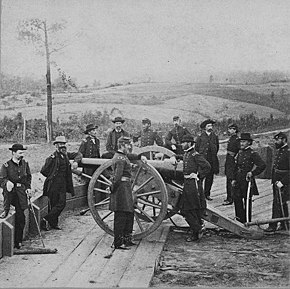Atlanta campaign
| Atlanta Campaign | |||||||
|---|---|---|---|---|---|---|---|
| Part of the American Civil War | |||||||
 Union Maj. Gen. William T. Sherman and his staff in the trenches outside of Atlanta |
|||||||
|
|||||||
| Belligerents | |||||||
|
|
|
||||||
| Commanders and leaders | |||||||
| William T. Sherman | Joseph E. Johnston; replaced in July by John B. Hood | ||||||
| Units involved | |||||||
| Army of Tennessee | |||||||
| Strength | |||||||
| 81,758–112,819 | Beginning- 60.000 Infantry, 11,000 cavalry, 7,000 Artillery | ||||||
| Casualties and losses | |||||||
|
31,687; (4,423 killed, 22,822 wounded, 4,442 missing/captured) |
34,979; (3,044 killed, 18,952 wounded, 12,983 missing/captured) |
||||||
Military Division of the Mississippi:
The Atlanta Campaign was a series of battles fought in the Western Theater of the American Civil War throughout northwest Georgia and the area around Atlanta during the summer of 1864. Union Maj. Gen. William T. Sherman invaded Georgia from the vicinity of Chattanooga, Tennessee, beginning in May 1864, opposed by the Confederate general Joseph E. Johnston.
Johnston's Army of Tennessee withdrew toward Atlanta in the face of successive flanking maneuvers by Sherman's group of armies. In July, the Confederate president, Jefferson Davis, replaced Johnston with the more aggressive John Bell Hood, who began challenging the Union Army in a series of damaging frontal assaults. Hood's army was eventually besieged in Atlanta and the city fell on September 2, setting the stage for Sherman's March to the Sea and hastening the end of the war.
At the start of the campaign, Sherman's Military Division of the Mississippi consisted of three armies:
On paper at the beginning of the campaign, Sherman outnumbered Johnston 98,500 to 50,000, but his ranks were initially depleted by many furloughed soldiers, and Johnston received 15,000 reinforcements from Alabama. However, by June, a steady stream of reinforcements brought Sherman's strength to 112,000.
Opposing Sherman, the Army of Tennessee was commanded first by Gen. Joseph E. Johnston, who was relieved of his command in mid-campaign and replaced by Lt. Gen. John Bell Hood. The four corps in the 50,000-man army were commanded by:
...
Wikipedia
